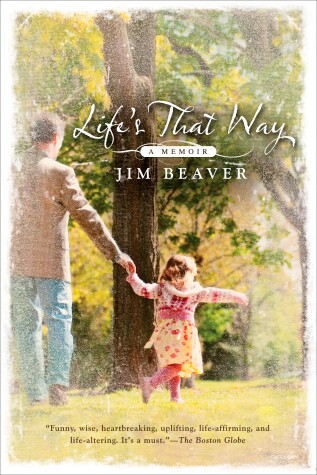Reviewed by Heather on
I came to this book in a roundabout way. In Lauren Graham's memoir she talks about a friend of hers writing a book. I looked that book up on goodreads. I scrolled down to the comments to see if anyone else liked it. One of the first comments mentioned that he was also friends with the author. I looked over at the icon and saw Jim Beaver's picture.
My first thought was, "Bobby Fisher wrote a book?" I know that he is not the character that he played on Supernatural but the idea was intriguing. I wanted to read it.
Towards the end of 2003, Beaver and his wife Cecily Adams's 2 year old daughter Maddie had stopped talking and was having melt downs. She was diagnosed as autistic. They were also in the process of building their dream house. They had moved out of their current house and into a rental until their house was finished. His father was slowly slipping into advanced dementia. Then Cecily was diagnosed with stage 4 lung cancer.
A few days after the diagnosis, he sat down and wrote a group email to family and friends explaining what was going on with Cecily. He started writing nightly updates to the group. People started forwarding his emails to other people who didn't even know him. I didn't understand why until I read the book.
The book is a sampling of the emails. They don't cover every day of the time he wrote from the day of her diagnosis until 1 year later. The emails themselves haven't been edited though. This is a day by day account of what it is like to watch your spouse die of cancer and what grieving looks like in real time.
That may sound incredibly depressing to read but it isn't. It is sad but not depressing. He notes the many kindnesses that their friends showed them. He especially talks about the people involved with That 70s Show, where Cecily was working as a casting director. They came over and decorated the house for Christmas for them. One woman who Cecily just knew hated her cleaned their house for them. He talks about what was helpful and what wasn't. This is a great book for anyone who ever wanted to help someone but didn't know what to do.
He's an amazing writer. He was incredibly open about what he was feeling each day. He talks about his fears - of losing his wife, of having to go away to jobs to earn money while his wife was sick, of dealing with a child who was already in crisis. He talks of the joys along the way. He talks about grief hitting you unaware just when you thought you were starting to function again. He remembers his life with his wife --both the good and the bad.
This is a hopeful book about what you can endure if you have to even if you don't want to. It helps to have a great support structure of friends and family around you like he did. I kept thinking that he must be a great guy to have friends like these.This review was originally posted on Based On A True Story
Reading updates
- Started reading
- 22 March, 2017: Finished reading
- 22 March, 2017: Reviewed
